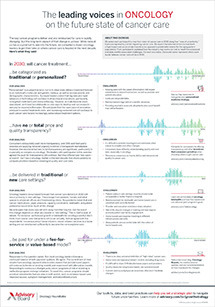Auto logout in seconds.
Continue LogoutThe "heart age" of cancer survivors is on average more than five years higher than their actual age, according to a new study from CDC, published in the Morbidity and Mortality Weekly Report on Friday.
Study details
For the study, researchers looked at data on 846,396 people between the ages of 30 and 74 years who participated in the Behavioral Factor Surveillance System's 2013, 2015, and 2017 survey cycles. Of those participants, there were 22,759 male cancer survivors and 46,294 female cancer survivors.
The researchers then estimated each person's predicted heart age using his or her 10-year risk for cardiovascular disease based on factors including his or her age, sex, diabetes status, smoking status, systolic blood pressure, hypertension treatment status, and body mass index.
When researchers compared participants' actual age with their heart age, they found notable discrepancies, HealthDay News reports. For instance, while male cancer survivors had a mean age of 48.7 years old, their mean predicted heart age was 57.2—an excess heart age of 8.5 years. Similarly, female cancer survivors had a mean age of 48.3 years old, but a mean predicted heart age of 54.8 years—an excess heart age of 6.5 years.
Overall, according to the study, "both excess heart age [the difference between a person's actual age and predicted heart age] and prevalence of excess heart age ≥5 years were higher among cancer survivors than among noncancer participants." Specifically, the prevalence of a predicted heart age greater than or equal to five years more than actual age was "3.0 percentage points higher for men and 6.5 percentage points higher for women among cancer survivors than among noncancer participants."
Discussion
According to the researchers, the new findings can be used by providers "to encourage cancer survivors to improve modifiable risk factors and make heart-healthy choices."
"By determining and communicating predicted heart age of cancer survivors at a personal level, cancer care teams can provide education to prevent long-term cardiovascular complications and improve quality of life and heart outcomes for cancer survivors" (HealthDay News, 1/7; Scott et. al., Morbidity and Mortality Weekly Report, 1/8).
Don't miss out on the latest Advisory Board insights
Create your free account to access 1 resource, including the latest research and webinars.
Want access without creating an account?
You have 1 free members-only resource remaining this month.
1 free members-only resources remaining
1 free members-only resources remaining
You've reached your limit of free insights
Become a member to access all of Advisory Board's resources, events, and experts
Never miss out on the latest innovative health care content tailored to you.
Benefits include:
You've reached your limit of free insights
Become a member to access all of Advisory Board's resources, events, and experts
Never miss out on the latest innovative health care content tailored to you.
Benefits include:
This content is available through your Curated Research partnership with Advisory Board. Click on ‘view this resource’ to read the full piece
Email ask@advisory.com to learn more
Click on ‘Become a Member’ to learn about the benefits of a Full-Access partnership with Advisory Board
Never miss out on the latest innovative health care content tailored to you.
Benefits Include:
This is for members only. Learn more.
Click on ‘Become a Member’ to learn about the benefits of a Full-Access partnership with Advisory Board
Never miss out on the latest innovative health care content tailored to you.

